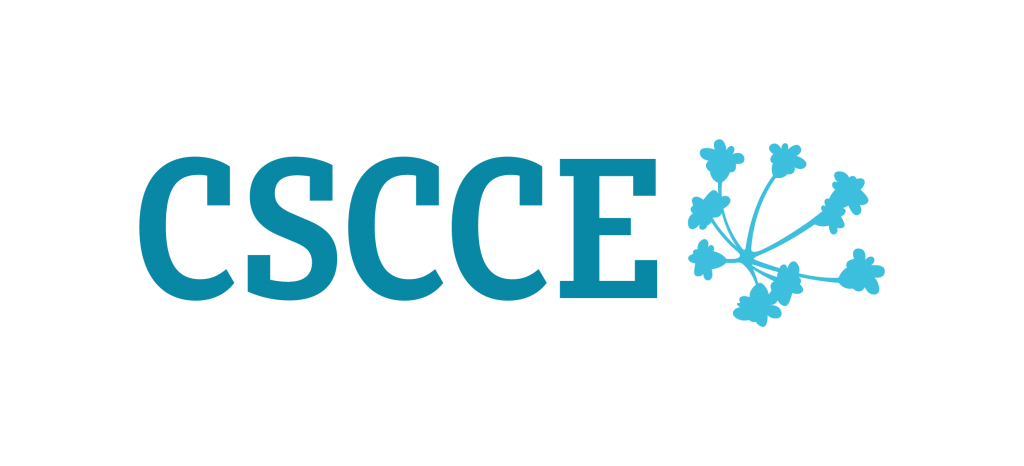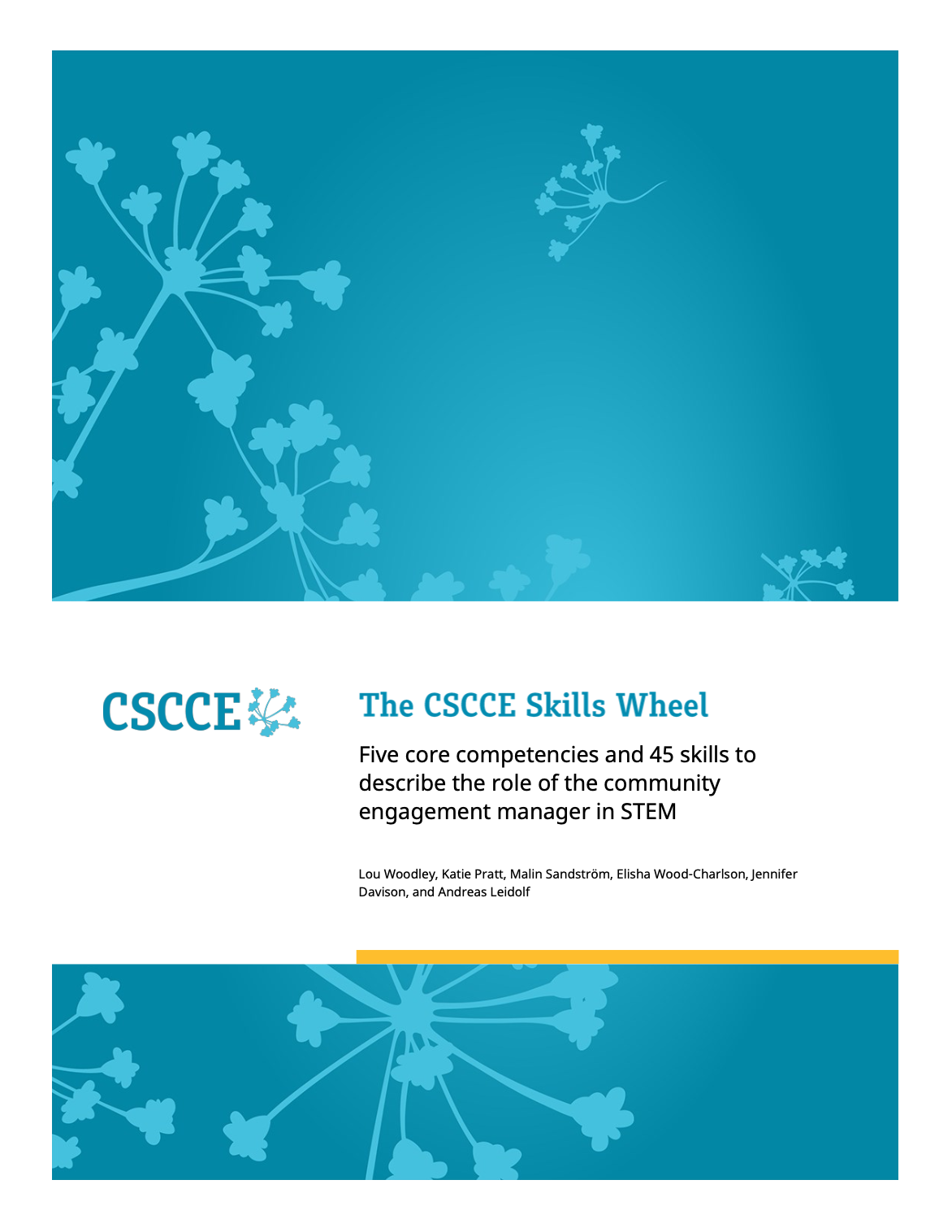If you’re looking to hire a community manager – perhaps for the first time – this collection of resources includes tips for doing so. It also includes information for first time community managers, or those who are starting to realize that their roles involve community management.
Page contents:
CSCCE Skills Wheel
In 2017, the CEFP2017 project team comprised of Jennifer Davison, Andy Leidolf, Malin Sandström, Elisha Wood-Charlson and Lou Woodley compared scientific community manager job descriptions to identify core skills. These were translated into a skills wheel and accompanying glossary that can be used to support conversations about hiring and training community staff – including how roles may be shared across a team.
The CSCCE Skills Wheel – Five core competencies and 45 skills to describe the role of the community engagement manager in STEM
by Lou Woodley, Katie Pratt, Malin Sandström, Elisha Wood-Charlson, Jennifer Davison, and Andreas Leidolf
This skills wheel is an output of the C3 project team from the 2017 cohort of the CSCCE Community Engagement Fellows Program (CEFP 2017). This guidebook is intended to be a brief, practical introduction to scientific community manager roles and provide a starting point for discussing common questions about them.
State of scientific community management survey
In 2016 we carried out a survey of over 100 scientific community professionals to determine more about their career paths to date, their skill sets and challenges.
For this survey we partnered with The Community Roundtable, who generously let us use and adapt their State of Community Management survey question bank which they use each year to look at corporate communities.
Our findings in brief

- Scientific community managers – often self-taught with a PhD – Almost two-thirds of scientific community managers that we surveyed have a PhD – and the same number are self-taught in terms of their community management skills.
- A closer look at the funding landscape for scientific community managers – funding for scientific community managers tends to vary depending on the type of organization their working for. Those with indefinite funding work for professional associations or in administrative roles in higher education.
- Exploring scientific community managers’ skill sets – engagement skills rank as the most important, but more experienced scientific community managers do more strategic tasks, less engagement.
- Online platforms are still making inroads in scientific communities -72% of respondents describe their organizations’ community platforms as either a distributed set of online tools without a primary platform, or as a dedicated online space that’s not integrated with other channels or business systems.
- How community managers shape activity planning – Community managers tend to result in more strategic, more regular programming – and online activities that invite member participation.
- Scientific community managers’ top challenges and training needs – prioritizing the number of tasks to do was the biggest challenge for survey respondents while they wanted training in communication planning and strategy development.
Blog posts
HIring A Scientific community manager
Scientific community managers bring a mix of skills to their roles – often combining scientific training with excellent communications. Resources in this section are aimed at hiring managers as well as prospective community managers – with advice to help you to make a good hire – and to succeed in your new role.
- Navigating the nuances of hiring a community team member – CEFP2019 Fellow, Liz Guzy describes some things to consider when expanding your team.
- CSCCE Director, Lou Woodley has written extensively about community manager skills and characteristics on her personal blog, including rounding up and extending work from related domains such as social learning theory and netweaving. Check out:
Setting yourself up for success
- Laying your happiness foundation when starting a new role – CEFP2019 Fellow, Ann Meyer shares some tips for thriving through a job transition.
- Launching a new community as a new community manager – CEFP2019 Fellow, Ellen Bechtol describes the successes of her first year.
- Strategies for survival in a newly-created community manager position – CEFP2017 Fellow and first-time community manager, Josh Knackert shares what he learned in the first year of his role.
Meet a community manager Series
In 2016 we published a series of blog posts where we asked existing community managers 5 questions about their career paths, their current roles, their challenges, and how they perceive community engagement within science.
While many of these community managers have transitioned to other roles (often still in community-building) the series provides a useful perspective on what these emerging roles can look like.
Tania Siemens
Community manager STEM Central – a community of practice for improving undergraduate STEM education.As technology advances and becomes more accessible, I think the online environment will come to feel as engaging as an in person meeting.
I believe the most important part of community engagement is two-way communication and the ability of people to listen first and then offer their expertise second.
Adding different perspectives, being respectful of each other’s viewpoints, working together towards a common goal… is so important to any community.
We are observing a real shift toward encouraging community building, driven at least in part by findings that grant funding flows toward strong networks.
…as scientists we often feel isolated…Communities can help us find a way to reach out from our individual labs and offices and collectively make a difference.
Anna Boyum
Science Communications Fellow Association for Research in Vision and Ophthalmology (ARVO)Online communities allow us to link limited clusters of knowledge that scientists possess individually into an unlimited network. Communities have a potential to exponentially expand the scientific conversation, which is key to the advancement of science.
…community is the infrastructure that science runs on – very few discoveries are the work of a lone genius building on nothing, many good collaborations run for decades – and engagement is the glue that binds that community together.
Community engagement is important for helping the scientific community work across its silos.
Particularly important, in my opinion, are the opportunities offered by community-building activities for building stronger, more effective collaborations.
Our active community management has created conversations and generated dialogues that traditionally would be really hard to execute.

- And if you’re now ready to start your first scientific community manager role – check out our companion page, “Being a Scientific Community Manager“
